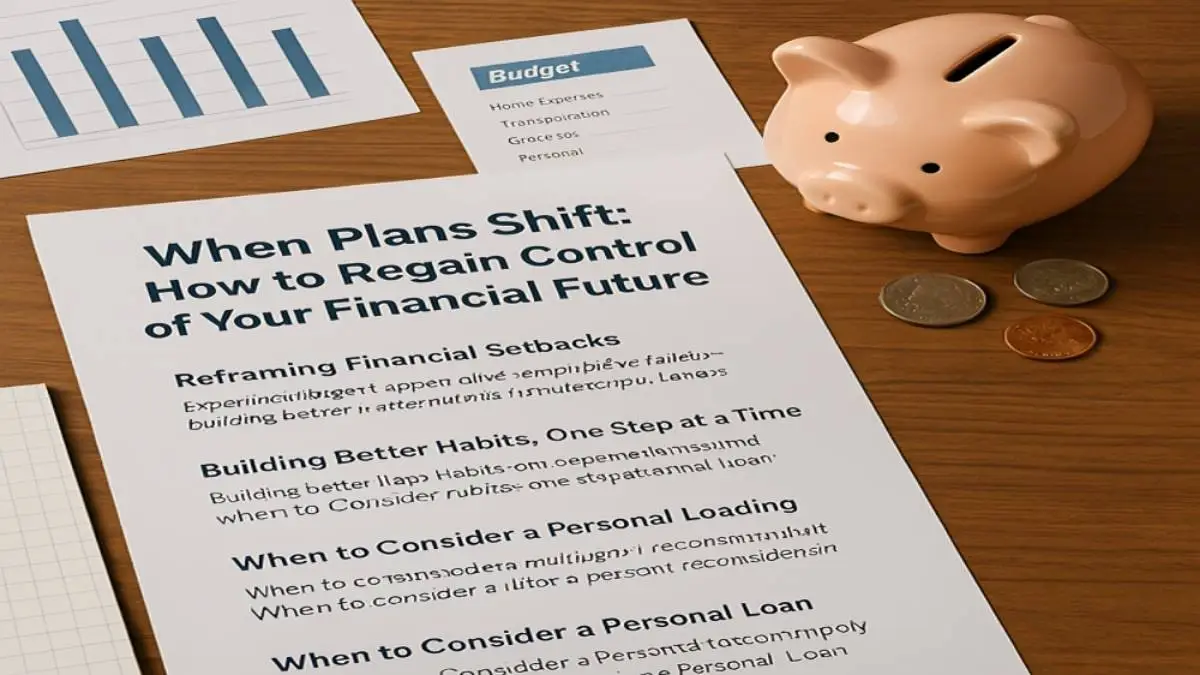TIPS
When Plans Shift: How to Regain Control of Your Financial Future

Introduction: When Life Doesn’t Go According to Plan
Financial stability is rarely a straight line. Whether it’s an unexpected layoff, a medical emergency, or a life transition like divorce or relocation, sudden changes can unravel even the most carefully crafted budget. In these moments, it’s not just about the money—it’s about regaining a sense of control and dignity.
While financial setbacks can feel isolating, they are far more common than most people realize. And thankfully, more support systems and financial resources exist today than ever before to help people bounce back.
Reframing Financial Setbacks
Experiencing a financial dip doesn’t mean you’ve failed—it means you’re human. Credit scores might drop, bills may pile up, but your current situation doesn’t have to dictate your long-term financial story.
In fact, many people who face financial struggles often find themselves more motivated to make meaningful changes. What matters most is your next move: whether that’s reducing debt, rebuilding your credit, or seeking out alternative lending solutions. There are borrowing options for any credit score that can help bridge the gap during difficult times and start you on the path to stability.
These tools are not quick fixes—but when used wisely, they can provide breathing room and structure so you can start working toward a stronger financial future.
Building Better Habits, One Step at a Time
Rebuilding doesn’t happen overnight, but small, consistent actions have a powerful ripple effect. Here are a few foundational habits that can help restore financial balance:
- Track Your Spending: Often, we underestimate how much we spend on daily habits. Using budgeting apps or even a simple notebook can shed light on where money is really going.
- Set Realistic Goals: Instead of aiming to eliminate all debt in one swoop, start with a single credit card or overdue bill. Small wins build momentum.
- Communicate with Creditors: It’s surprising how often lenders are willing to negotiate if you’re honest about your situation. Whether it’s adjusting due dates or setting up payment plans, it never hurts to ask.
- Avoid Emotional Spending: When stress levels are high, it’s easy to justify comfort purchases. Awareness is key—find non-financial ways to manage stress like walking, journaling, or talking with a trusted friend.
The New Landscape of Lending
Traditional banks have long served as gatekeepers to financial products. But as technology evolves, so do lending practices. Today, financial institutions are using more nuanced tools to evaluate a person’s creditworthiness. This means that even if you’ve struggled in the past, you might still qualify for flexible and responsible lending options.
Fintech companies and alternative lenders are making credit more accessible without encouraging recklessness. These lenders often provide transparency, personalized repayment schedules, and the opportunity to build back credit responsibly.
It’s about meeting people where they are—and offering paths forward that don’t involve judgment or shame.
When to Consider a Personal Loan
There’s a difference between using credit as a lifeline and using it as a lifestyle. A personal loan, when used with intention, can be a strategic tool. Consider a loan if:
- You’re consolidating multiple high-interest debts into a single, manageable payment
- You need funds for an emergency repair or essential medical expense
- You’re trying to stabilize your cash flow without relying on revolving credit cards
Always run the numbers first. Understand the terms, the total cost of borrowing, and how the monthly payments fit into your overall budget. Being proactive now can save you from future stress.
Restoring Confidence Along the Way
Financial difficulties often impact more than just your bank account—they can weigh heavily on your self-worth. But here’s the truth: Your value isn’t tied to your credit report. Confidence comes from the choices you make moving forward.
It’s important to surround yourself with the right information and support systems. Financial literacy resources, community programs, and reputable lending platforms are there to help—not to trap.
A More Compassionate Financial Future
The stigma around money problems is slowly being dismantled. We’re starting to have more honest conversations about the real cost of living, the unpredictability of life, and the resilience it takes to ask for help.
Whether you’re just beginning to recover or already seeing signs of progress, remember that you’re not alone. The tools exist, the support is out there, and your story is far from over.
In the end, it’s not about perfection—it’s about direction.
Conclusion: Keep Moving Forward
You don’t need flawless credit or a perfect plan to move toward financial healing. What you need is the willingness to take the next step—even if it’s small. Every bill paid, every dollar saved, and every responsible decision adds up.
Life may have thrown you off track, but the journey isn’t over. With the right mindset and the right tools, you can reclaim control—one smart decision at a time.
-

 BIOGRAPHY9 months ago
BIOGRAPHY9 months agoBehind the Scenes with Sandra Orlow: An Exclusive Interview
-

 HOME1 year ago
HOME1 year agoDiscovering Insights: A Deep Dive into the //vital-mag.net blog
-

 HOME1 year ago
HOME1 year agoSifangds in Action: Real-Life Applications and Success Stories
-

 BIOGRAPHY1 year ago
BIOGRAPHY1 year agoThe Woman Behind the Comedian: Meet Andrew Santino Wife




























